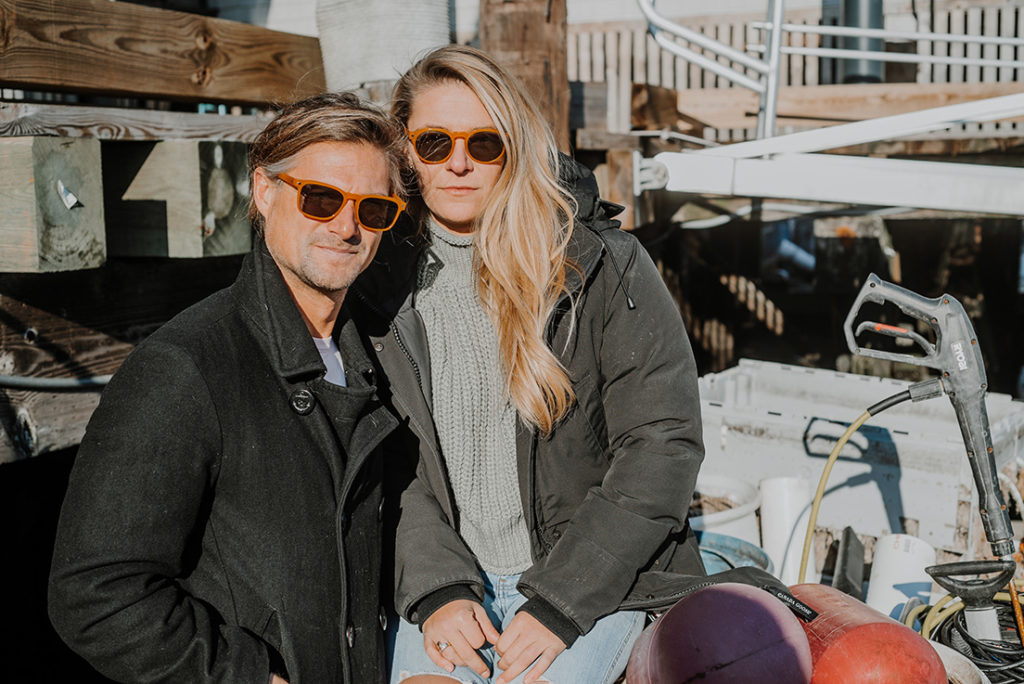The Entrepreneur Turning Water Bottle Waste into Sunglasses
Founded by a Kennebunk native, Opolis Optics gives back to the planet by cleaning up shorelines and providing jobs in developing countries.

For a decade, James Merrill worked as a contractor for the U.S. Agency for International Development and for small nongovernmental organizations in the Middle East, Africa, and Southeast Asia, helping implement initiatives ranging from protecting biodiversity to countering violence to empowering women.
During that time, the Kennebunk native saw coast-lines in developing countries being inundated with plastic water bottles that wash up on shore. He also witnessed residents in some of those very same communities being recruited for employment by terrorist groups. Merrill came up with a lofty but elegant solution: he would pay locals to collect the discarded water bottles, offering an alternative to more dangerous means of making a living, and then use the plastic from the bottles to make sunglasses that he would market. “We can prevent people from promoting violence and help people clean up their coastlines by focusing on water bottles,” he says.
But he ran into a problem when manufacturers tried to turn the salvaged water bottles into a material solid enough for use in sunglasses. Even though these manufacturers had worked with recycled plastic before, because the bottles Merrill was sourcing had been exposed to the elements, their chemical structure had broken down and the material kept falling apart.

As a result, Opolis Optics, which Merrill launched in April 2020, started with a line of sunglasses made not of bottle plastic but of environmentally friendly bio-acetate, which will biodegrade in landfills within 115 days. But Merrill’s bigger goal of providing both economic opportunities to impoverished communities and a market for ocean waste went unrealized until recently, when he connected with a composites lab at the University of Southern Maine (USM).
Merrill first learned of the university’s Composites Engineering Research Laboratory (CERL) through his membership in the New England Ocean Cluster, a Portland business development group and collaborative working space for ocean-related companies that partner with USM. CERL, which often helps companies solve production issues like Merrill’s, was able to create a composite made primarily of the recovered water bottles that was strong enough to use for sunglasses.
For an initial run of 2,400 sunglasses with the recycled material, branded Stoked Plastic, Merrill paid locals to collect more than 300,000 water bottles from the Bali coastline. A factory in Jakarta, Indonesia, cleaned the bottles and ground them into pellets, which were then shipped to China for manufacturing. Merrill says he would eventually like to move manufacturing to the United States, even Maine, but that option is at least two years out.
Opolis Optics will test-pilot its water bottle collection work in the Philippines and Kenya next. “We have a responsibility,” Merrill says. “These people didn’t ask for any of this crap, nor do they have the infrastructure to handle it.”
Asheesh Ravikumar Lanba, who is director of CERL and a professor at USM, says that, while a lot of work is being done to create sustainable polymers, a bigger issue is what to do with all the plastic waste that already exists in the ocean. “There is only one solution to that problem—other than shooting it into space,” Lanba says. “We need to recycle it.” What is unique about Opolis Optics is that it’s providing a market for this plastic bottle waste, Lanba says.

Since CERL created the recycled plastic composite for Opolis Optics, other companies and industries have reached out to Merrill to see if they can utilize the material for different applications. That was always Merrill’s hope when he started this venture: he figured if he could popularize sunglasses made with the material, it would raise awareness a lot quicker than if he used it to make an industrial part. “The sunglasses are almost a conversation starter about what we can do with this material and technology,” he says.
Where to Find Them
Along with being sold on the company’s website, Opolis Optics sunglasses will be sold at L.L.Bean, Toad and Co., Dannah for Men, Portland Dry Goods, Maine Sport Outfitters, Sea Bags, and other retailers around Maine. The recycled plastic models retail for $145, and the bio-based sunglasses retail for $175.
Read More:
- Claiming Space at the Table

- How to Go Antiquing Like a Mainer

- Four Young Writers to Watch in the Pine Tree State

- Milkweed Man


